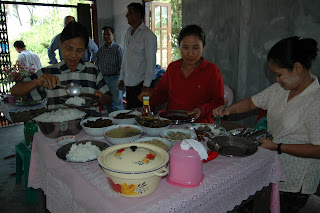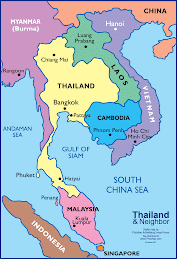A van from the Myanmar Baptist Convention Union met us at 5:30 a.m. at our hotel on Monday, February 23 to carry our team to a village in lower Bogelay Township. Bogelay is less one hundred miles from Yangon in the Irrawaddy River delta near the Bay of Bengal. This area is at sea level and was devastated by Cyclone Nargis in May, 2008. We were particularly interested to visit this area and view the reconstruction efforts of Burmese Baptists and their international Baptist partners.
It was an arduous journey. The twenty-five year old van that transported us (like every vehicle we rode in while in Myanmar) lacked functioning air conditioning. Consequently, we opened windows to combat the mid-90's temperatures and high humidity. However, most of the roads between Yangon and Bodelay were potholed black top, crushed gravel, or unimproved dirt lanes. Soon, all of the passengers and their possessions were covered with a thick layer of dust and grime. Once we reached Bogelay (pictured below) we transfered to two different boats that carried us a couple of additional hours to our final destination.

Our journey took a total seven and a half hours each way. We returned to our hotel at 10:30 p.m. dirty and exhausted. Yet, it was for me one of the most memorable aspects of our time in Myanmar.
The boat pictured to the upper left in the photo below is owned by the Myanmar Baptist Convention Union and carried us most of the way to the village we visited near the Bay of Bengal.

As we traveled by boat through the Irrawaddy Delta, we could see the after-effects of Cyclone Nargis: uprooted trees, rice fields turned brown by salt contamination, and the simple bamboo homes of the area covered with blue plastic tarps.

 Sadly, more than eighty villagers lost their lives to the storm. Women and children were particular vulnerable to the destuctive power of the cyclone. In the days following the storm, bodies from neighboring villages also were found in the nearby waterways. The pastor of the Baptist church (shown below with his wife), officiated at funerals for all those from the village who died; as well as those whose bodies washed ashore in the village.
Sadly, more than eighty villagers lost their lives to the storm. Women and children were particular vulnerable to the destuctive power of the cyclone. In the days following the storm, bodies from neighboring villages also were found in the nearby waterways. The pastor of the Baptist church (shown below with his wife), officiated at funerals for all those from the village who died; as well as those whose bodies washed ashore in the village. 
Despite the material poverty of their lives and the terrible losses they experienced in last year's cyclone, we found people of hope and faith working together to rebuild their church, community, and lives. This largerly Baptist community is eager to reach out their neighbors in compassion and concern. They welcomed us with with warm smiles and a small feast for lunch cooked from locally grown produce, fish, and freshly caught mice (yes, mice!).
The mouse paste with chilies is on the upper right corner of the table, next to bottle of ketchup, in the photo above. These folks make use of every last bit of the bounty of the earth God offers them!

Despite our differences in cuisine, it was a great honor to be welcomed by these brothers and sisters. They are truly remarkable people. It was well worth the long and challenging trip to witness their faith and hope and experience their generous and welcoming hospitality.


